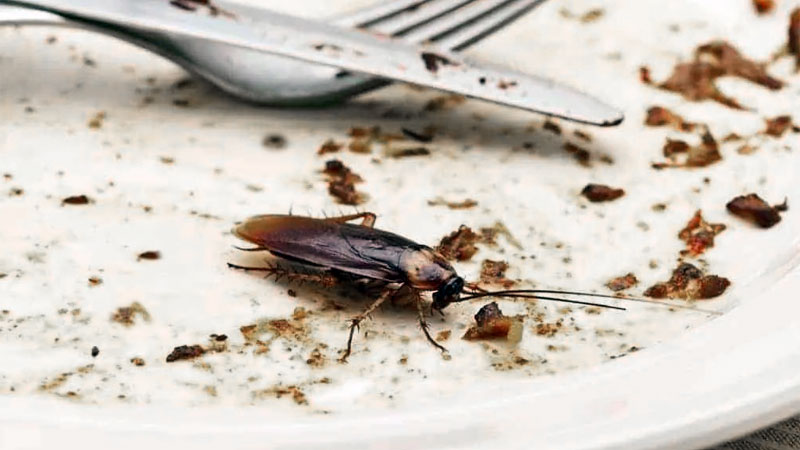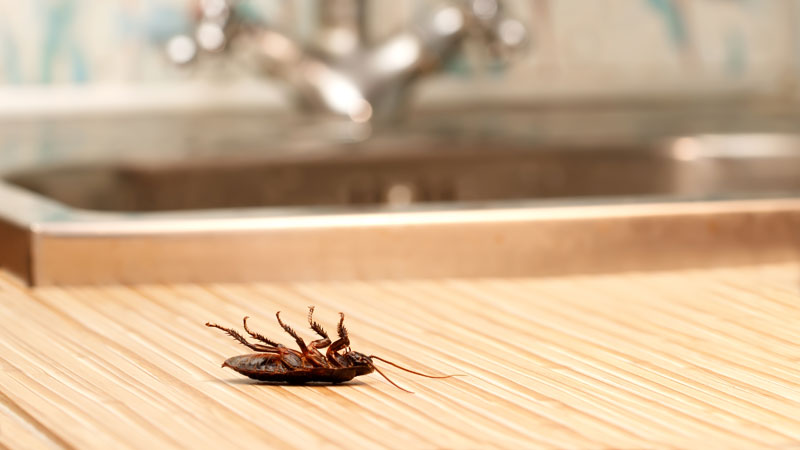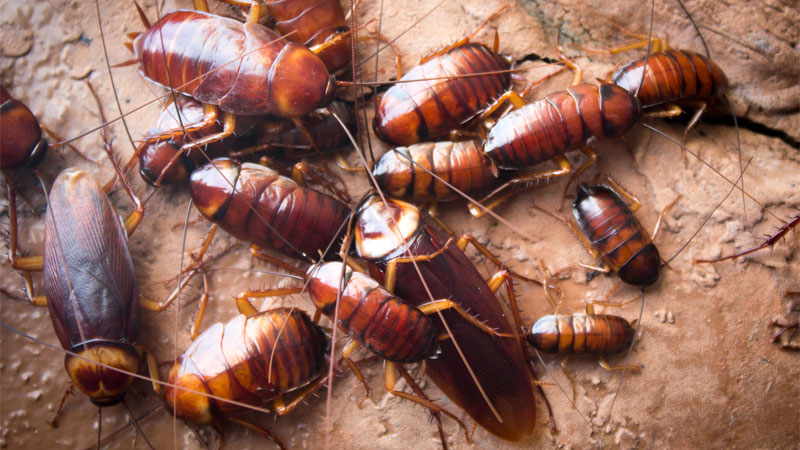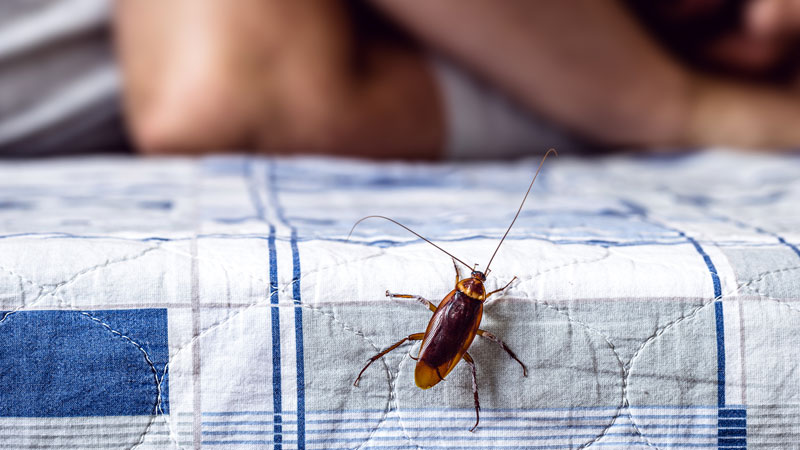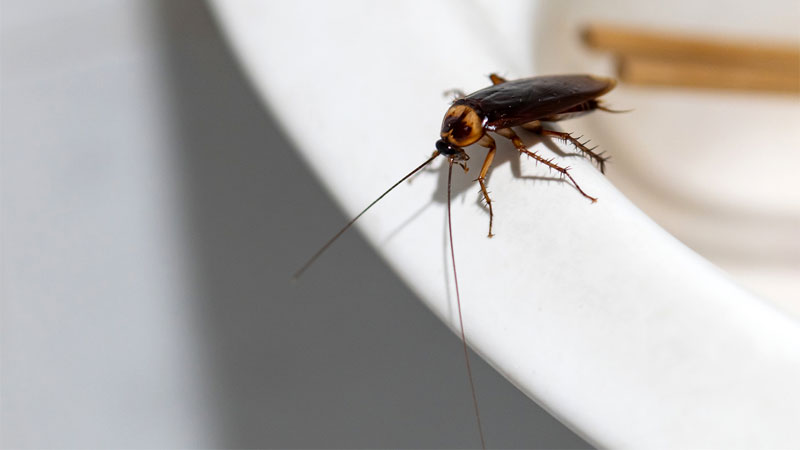There’s an old saying: The only things that will survive a nuclear winter are cockroaches and Twinkies.
Well, Family Guy already proved that Twinkies can last forever, but what about roaches?
Just how long can cockroaches survive without food or water, and how long can they live overall?
Let’s take a moment to look at what happens when a cockroach needs to withstand extended periods without sustenance.
How Long Can Roaches Live Without Food?
This is actually a very complicated question, since roaches can live off of things you wouldn’t consider food. This means they might be finding sustenance when you think they’re starving.
Average Cockroach Lifespan Without Food
As cold-blooded insects, roaches have the ability to regulate their body temperature according to their surroundings. This adaptation helps them conserve energy, directly affecting how long roaches live without food.
On average, cockroaches can live for up to one month without eating.
Can Roaches Survive Without Food for Longer?
Different factors can influence how long cockroaches can live without food, including their species, size, and the availability of water.
For example, larger species typically survive longer than smaller ones without food, while female cockroaches may be more resilient than their male counterparts. Many species are adapted to life in more barren environments, further extending their ability to go without eating.
Access to water is another critical factor for cockroach survival. Even a small drop of water can help cockroaches survive for weeks without food. This is why cockroaches are so common in more humid states like Florida and California.
But just what’s considered food for these little pests?
Diet
Roaches have a rather diverse diet, making it easy for them to find sustenance in any environment. They’ll eat anything from human food scraps to garbage, pet food, and even things like cardboard or glue.
As their environmental purpose is breaking down dead matter, especially wood, there’s not much they can’t digest. This wide variety of potential food sources allows them to thrive even in homes with limited access to organic materials.
See Also: What Do Roach Droppings Look Like?
How Roaches Digest Food
One of the many evolutionary tricks these critters have learned is how to eat on the move. These insects have both internal and external digestion systems, meaning they can break down food both inside and outside their bodies
This is thanks to the digestive enzymes in their saliva, which helps break down food particles they come into contact with.
This efficient digestion process allows roaches to extract nutrients from a vast range of food sources and contributes to their resilience in various environments.
Why Are There Roaches in Rooms With No Food?
There are a couple good reasons why this can happen.
One good reason is that cockroaches are resourceful creatures that can find sustenance in unconventional sources. They might be attracted to items in your room that you wouldn’t consider to be food, such as paper, glue, hair, or even dead skin cells.
Keep in mind that roaches can be particularly drawn to areas with high humidity, so damp environments may also play a role in their presence.
Another reason is that roaches might enter your room in search of shelter or nesting grounds, regardless of the availability of food. They are drawn to dark, warm, and secluded spaces, making almost any room a potential target.
Will Roaches Go Away If There Is No Food?
Roaches can survive for an extended period without food, with the ability to go hungry for up to a month.
This impressive survival skill is due to their capacity to extract nutrients from unconventional sources like glue or raw meat. When conventional food becomes scarce, they’ll begin attacking anything they deem edible.
Effects of Starvation on Roaches
When food is scarce, roaches have adapted to survive for extended periods without nourishment.
In response to starvation, a cockroach’s metabolism and heart rate slow down, and they stop producing new eggs. These adjustments allow roaches to survive for days or even weeks without food.
They can also rely on their fat reserves for weeks, giving them a significant advantage in enduring food shortages. In extreme circumstances, cockroaches may even resort to cannibalism to survive.
See Also: Why Finding Dead Roaches Isn’t Always a Good Thing
How Long Can Roaches Live Without Water?
Although roaches can survive long periods without food, they typically need water more frequently. Generally, these pesky insects can only stick it out without water for about a week.
Just One Drop
It’s worth noting that roaches don’t necessarily require a significant water source to survive. Even a single drop of water can be enough to help them last for several weeks.
This is one of the reasons it can be hard to eliminate them from your living space.
Humidity
Humidity also plays a huge role in survivability, providing moisture straight from the air. This is why kitchens, bathrooms, and basements are common places to find them.
Survivability
Cutting off access to sources of moisture will cut a cockroach’s ability to survive without food by 75 percent.
Additionally, while some species need less water, nymphs will always need more than adults. This means you can significantly slow the growth of a roach infestation by drying them out.
Understanding how moisture can allow a cockroach to go longer without food is an important factor that isn’t discussed often enough.
Read Also: Can Cockroaches Survive in Cold Weather?
Final Notes
A cockroach’s ability to survive without food is nothing short of incredible. Most roaches can live without food for up to one month, while some specific species and individuals may survive even longer.
For example, despite popular belief (some claim they can live up to 50 or even 300 days), a female German cockroach will live for about 13 days without food or water, while males will live eight days.
With only water, they can both live up to 30 days.
Although their resilience is impressive, it’s important to note that most roaches can only survive for about one week without water. Therefore, limiting their access to water sources in your home can be an effective way to curb their survival capabilities.
- How to Identify Skunk Poop (With Pictures) - April 1, 2024
- You Really Don’t Need That Opossum Trap - January 4, 2024
- How to Set a Mouse Trap Without Getting Hurt - December 28, 2023

